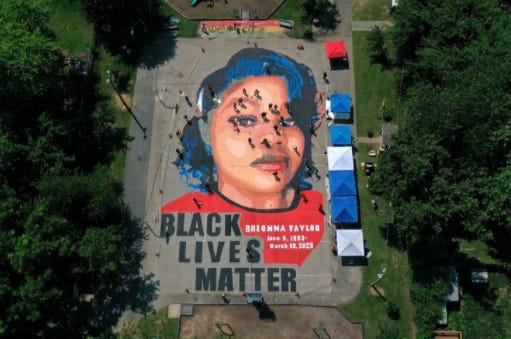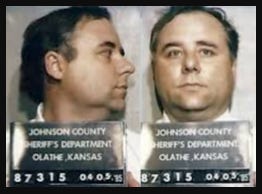DOJ vs. Louisville PD · Dan Abrams · Best American Crime Writing 2002
Plus: Tulsa, Wade Robson, and the Brooklyn DA
The Justice Department announced earlier this week that it’s launching an investigation into police practices in Louisville. Over 13 months after the murder of Breonna Taylor, the DOJ probe
will examine whether Louisville officers routinely violate citizens’ rights, including by illegally executing search warrants on private homes, [Attorney General Merrick] Garland said. It will also seek to determine whether officers use excessive force, discriminate based on race and engage in unconstitutional stops, arrests and seizures.
The investigation comes less than a week after Garland announced a similar probe into Minneapolis PD; it’s unclear if they’re the same type of probe, as described in the quote below, but evidently the one in Louisville isn’t just about the killing of Taylor, but the broader culture that created it:
The new probe, known as a pattern-or-practice inquiry, is separate from a more specific federal investigation into Ms. Taylor’s killing. In addition to studying officers’ use of force, the Justice Department will seek to determine whether they discriminate based on race or fail to provide public services to those with disabilities, Mr. Garland said. Officials from the department’s civil-rights division and the local U.S. attorney’s office will review the police department’s policies and training and examine whether officers are effectively held accountable.
My first thought, which I even put in our story budget: “About fucking time.” My second thought: even if this isn’t a cynically motivated inquiry undertaken strictly for optics, it’s going to end up that way, because as well-meaning and determined as Garland and the DOJ/U.S. attorneys might be, increased attention on biased policing and excessive force going back at least to Eric Garner has done almost nothing to change police culture — or even trash the “bad apples” badge-humpers are always blaming for lethal “incidents” (ugh). In fact, it only seems to make the PDs under scrutiny rigidly defensive and resistant to change, often to a threatening degree, and a WaPo piece on that phenomenon by Nicole Dungca and Jenn Abelson yesterday appears to find a bleak prediction in a similar DOJ investigation into Albuquerque PD from almost a decade ago. APD had “fatally shot 20 people” in the four years leading up to 2012, at which time the government had seen enough and demanded reforms, including “a new civilian oversight agency with greater authority.” As you can probably guess because you were not born yesterday, the cops did not run giddily into the arms of change:
The police union sued to block the new agency and later demanded the resignation of an agency board member who pushed to tighten the police department’s use-of-force policy. The city council took four years to give the agency stronger subpoena power for its investigations. And veteran police officials pushed back against efforts to increase scrutiny of the department’s use of force, creating a backlog of investigations that has prevented the agency and its board from completing their reviews of most fatal shootings.
The piece goes on to note, among other predictably enraging intel, that civilian-oversight “entities” in Minneapolis “had fielded 12 complaints of alleged misconduct about” Derek Chauvin prior to Chauvin’s murdering George Floyd, so my dubiety (probably not a word; let’s go with it) re: the “let’s form a committee and then make some recommendations, that’ll do it!” “plan” is not without basis.
Dungca and Abelson detail the toothlessness of various reform bodies; the excessive power wielded by police unions, which is frequently used to emotionally blackmail communities; and pro-cop arguments that insist civilians don’t “get it” and can’t judge police as a result. Many civilian board members give up in despair; others get targeted for harassment and back away; mayors run on police reform and then can’t move the ball. It’s not a very hopeful piece and I didn’t really see any suggestions for how change might be effected, which makes me think — forgive me for what I’m about to say — that recent SVU episodes are right about change and reform needing to start within police departments. But it doesn’t seem IRL like there’s a critical mass of good “apples” committed to de-escalation or community welfare or anything that doesn’t reinforce the power of their death cult. — SDB
April bonus content is heading your way soon; let’s pick May’s! We’ve got a couple podcasts, some Sorkin, some Catherine Keener, and a doc…
…all selected randomly from my massive To-Consume List and all properties I’m intrigued by, so you can’t help pick me a good one! — SDB
And now it’s time for a round-up, because our budget doc is getting crowded again and I can feel Eve getting itchy from clear across the country. Ready? Here we go…
The History Channel’s Tulsa race-massacre documentary, Tulsa Burning, has a premiere date. Set those DVRs for May 30th at 8 PM ET; the trailer is below. [Futon Critic]
Wade Robson’s Michael Jackson lawsuit got tossed. Robson, who figured heavily in HBO’s Emmy-winning Leaving Neverland, alleged that the corporations started by Jackson had an obligation to protect him “the same way Boy Scouts or a school” would; a judge disagreed. [Baltimore Sun]
Dan “Rasputin” Abrams has yet another series coming to A&E this summer. Court Cam Presents Under Oath “tells the story of a crime from the unique lens of the accused as they take the witness stand. Hosted by Dan Abrams, each episode will cover everything from first-hand defendant testimony, juxtaposed with the contentious cross examination to the final verdict.” That’s all [sic], by the way, and whoever drafted this PR blast should probably get ticketed for misdemeanor word salad. If you’re not inclined to learn more, I…don’t blame you, but click the link anyway and tell me if that photo of Abrams isn’t of his figure at Madame Tussaud’s. [Deadline]
Scott Peterson appeared in court yesterday (via Zoom). Proceedings relating to the re-examination of the penalty phase of Peterson’s trial — as well as Peterson’s challenge to his conviction based on a juror misrepresenting her past — resulted in a 60-day discovery order. [NBC Bay Area]
Are You The One? has shut down production after a past contestant detailed a sexual-assault allegation to The Daily Beast a couple weeks ago. Gianna Hammer said she was drugged by production, and sexually assaulted by a castmate, during filming of AYTO S05, which aired in 2017. MTV stopped production on the ninth season and removed the fifth from streaming options after the TDB story broke; Hammer was reluctant to come forward after Bachelor In Paradise’s Corinne Olympios’s experience with ABC in a similar situation. My esteemed colleague Andy Dehnart has no shortage of material in his excellent archive about MTV’s prior bad acts — or failures to act — in this department. [reality blurred]
An undercover cop’s perjury charges in Manhattan may result in 90 convictions getting thrown out in Brooklyn. Joseph Franco’s testilying was so blatant that Brooklyn DA Eric Gonzalez kind of has no choice but to vacate various convictions based on Franco’s “work.” Gonzalez has seemed highly motivated to chuck out the kinds of charges — minor drug possession; sex work — that disadvantage people of color and widen pipelines to law-enforcement “contact” and incarceration, so it’s not really a surprise that his response to finding a bunch of Franco’s cases in Brooklyn’s files was basically “okay so: Ctrl-A/delete.” [New York Times]
And let’s wrap things up with a Vanity Fair longread from 20 years ago. Featured in Best American Crime Writing 2002, David McClintick’s “Fatal Bondage” is a deep dive into the life and crimes of “genial” con man and serial killer JR Robinson, who as of this writing is still on Kansas’s death row. How did authorities finally stop Robinson? A woman pressed charges against him for stealing her sex toys. [Vanity Fair] — SDB





I voted for Petit Gregory à cause de ma francophilie rampant and its generally a wild, horrid story. As an aside, “Le corbeau” (the crow) is the French term for an anonymous poison pen writer and it gets said approx four million times in the show. The term comes from a 1943 film called Le Corbeau which they play excerpts of and I am actually seeing it on Saturday at the movies. My most obscure "true crime adjacent" excursion yet!